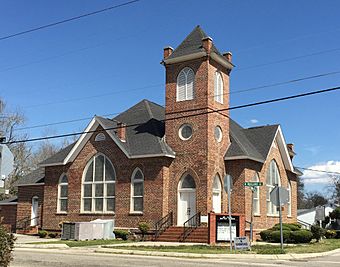Mt. Olive Baptist Church (Mullins, South Carolina) facts for kids
Quick facts for kids |
|
|
Mt. Olive Baptist Church
|
|
 |
|
| Location | 301 Church St., Mullins, South Carolina |
|---|---|
| Area | less than one acre |
| Built | 1922-1926 |
| Architect | Ford, Wade Alston |
| Architectural style | Late Gothic Revival |
| NRHP reference No. | 00000695 |
| Added to NRHP | June 15, 2000 |
The Mt. Olive Baptist Church is a very old and important church building. You can find it at 301 Church Street in Mullins, South Carolina. This church was built a long time ago, between 1922 and 1926. It is a special example of a building style called Late Gothic Revival.
This church was very important to the African-American community in Mullins. It served as a central place for people to gather and support each other.
What Makes It Special?
The Mt. Olive Baptist Church is made of brick and has a unique shape. It looks like a cross from above, which is called a "cruciform" shape. The roof is quite interesting, with different slopes and peaks.
The church has two towers on its corners, but they are not the same height. Above each main entrance, there is a round stained glass window. These round windows are called "oculus" windows. There is also a bell tower, which is a tall part of the church where bells are kept. This bell tower has four large, pointed arch openings.
You can also see a very large stained glass window with three parts. It has a Gothic arch shape. On each side of this big window, there are tall, narrow stained glass windows called "lancet windows." All these details make the church look beautiful and grand.
Its History and Importance
Because of its special design and its important role in the community, the Mt. Olive Baptist Church was added to the National Register of Historic Places in 2000. This list helps protect important buildings and places in the United States. It means the church is recognized as a significant part of history.
 | George Robert Carruthers |
 | Patricia Bath |
 | Jan Ernst Matzeliger |
 | Alexander Miles |



